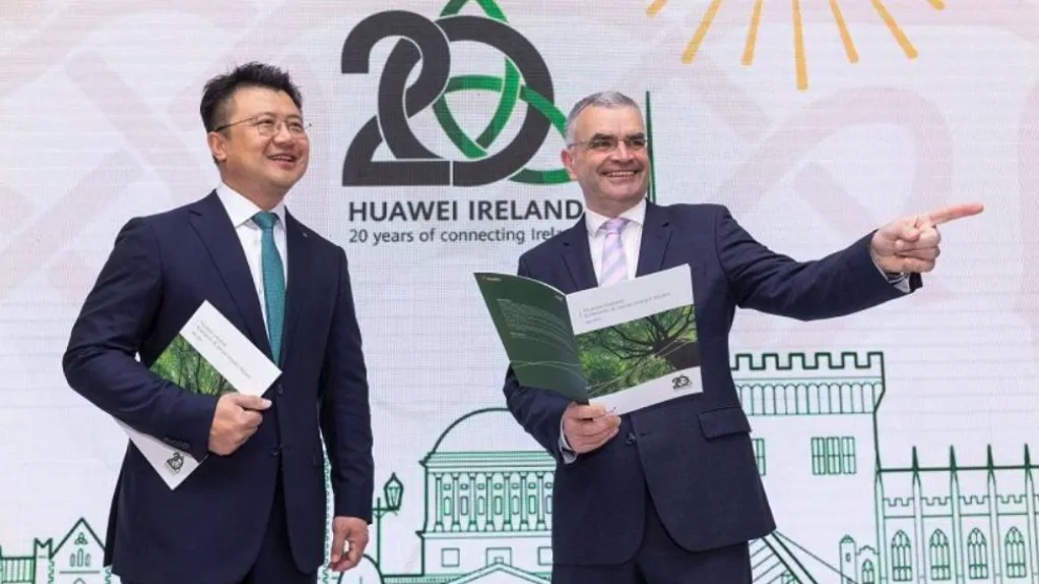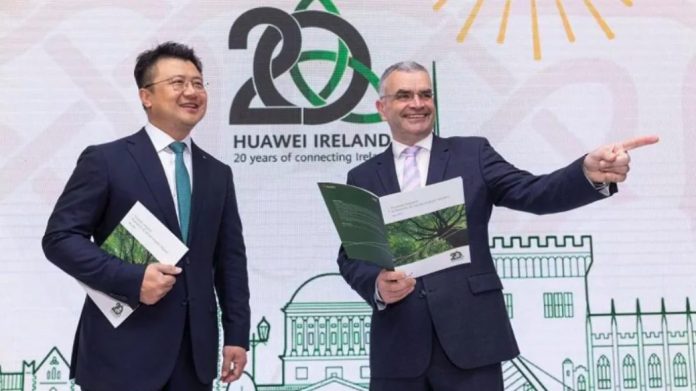เศรษฐกิจไอร์แลนด์กำลังดึงดูดการลงทุนจากจีนเพิ่มขึ้นเรื่อย ๆ แต่คำถามที่ตามมาคือ มันสร้างความเสี่ยงต่อชื่อเสียงของประเทศหรือไม่
ในปี 2020 มีบริษัทจีน 25 แห่งดำเนินงานในสาธารณรัฐไอร์แลนด์ แต่ภายในปีนี้ จำนวนได้เพิ่มขึ้นเป็น 40 แห่ง
สำหรับบางคน การหลั่งไหลของเงินหยวนนี้ถือเป็นโอกาสให้ไอร์แลนด์ลดการพึ่งพาในการเป็นฐานทัพยุโรปของบริษัทเทคโนโลยีจากสหรัฐฯ เช่น Apple และ Alphabet และยังสร้างงานเพิ่มเติมอีกด้วย
แต่สำหรับนักวิจารณ์จำนวนมาก การที่ไอร์แลนด์เป็นที่ตั้งของบริษัทจีนกลับสร้างความเชื่อมโยงกับข้อกล่าวหาเรื่องการละเมิดสิทธิมนุษยชนต่อบริษัทบางแห่ง ซึ่งรวมถึงบริษัทเสื้อผ้าจีน Shein ที่ตั้งสำนักงานใหญ่อยู่ในดับลินตั้งแต่เดือนพฤษภาคม 2023
Shein ถูกวิพากษ์วิจารณ์มานานเกี่ยวกับสภาพการทำงานของคนงานในโรงงานผลิตเสื้อผ้า และเมื่อต้นปีนี้บริษัทก็ต้องยอมรับว่าพบการใช้แรงงานเด็กในเครือของตน
รัฐบาลไอร์แลนด์จึงอยู่ในสถานการณ์ที่ลำบากทางการทูตเพราะพยายามดึงดูดบริษัทจีนหลายแห่งที่ถูกสหรัฐฯ คว่ำบาตร
ตัวอย่างเช่น บริษัทโทรคมนาคม Huawei และบริษัทเภสัชกรรม WuXi Biologics
ในเดือนพฤษภาคม ดารา คาลเลียรี รัฐมนตรีการค้าของไอร์แลนด์ ได้แสดงความยินดีในรายงานที่ฉลองว่า Huawei มีส่วนช่วยเศรษฐกิจไอร์แลนด์ถึง 800 ล้านยูโรต่อปี บริษัทมีศูนย์วิจัยและพัฒนา 3 แห่งในไอร์แลนด์
Huawei เป็นบริษัทเดียวกับที่อุปกรณ์เครือข่ายโทรคมนาคมถูกสหรัฐฯ สั่งห้ามตั้งแต่ปี 2022 เนื่องจากความกังวลด้านความมั่นคงแห่งชาติ สหราชอาณาจักรก็ได้ดำเนินการในทิศทางเดียวกัน โดยสั่งให้เครือข่ายโทรศัพท์ถอดส่วนประกอบของ Huawei ออก และเครือข่ายโทรศัพท์มือถือในหลายประเทศตะวันตก รวมทั้งไอร์แลนด์ก็ไม่ได้จำหน่ายโทรศัพท์ Huawei อีกต่อไป
ในขณะเดียวกัน WuXi ได้ลงทุนกว่า 1 พันล้านยูโรในสถานที่ตั้งใน Dundalk ใกล้พรมแดนไอร์แลนด์เหนือมาตั้งแต่ปี 2018
เมื่อต้นเดือนนี้ สภาผู้แทนราษฎรสหรัฐฯ ได้ผ่านร่างกฎหมายจำกัดความสามารถของบริษัทอเมริกันในการทำงานร่วมกับ WuXi โดยอ้างถึงความกังวลด้านความมั่นคงแห่งชาติ ร่างกฎหมายนี้จะถูกส่งต่อไปยังวุฒิสภาสหรัฐฯ
สำนักงานพัฒนาภาคอุตสาหกรรมของไอร์แลนด์เป็นหน่วยงานของรัฐบาลที่มีหน้าที่ดึงดูดการลงทุนจากต่างประเทศเข้าสู่ประเทศ ไอร์แลนด์มีสำนักงานในจีน 3 แห่ง และระบุว่า “ส่งเสริมไอร์แลนด์ในฐานะประตูสู่ยุโรปสำหรับนักลงทุนจีน”
อีกบริษัทจีนที่มีสำนักงานใหญ่อยู่ในไอร์แลนด์คือ TikTok แอปวิดีโอสื่อสังคมออนไลน์ ซึ่งเป็นเจ้าของโดย ByteDance บริษัทแม่ที่ตั้งอยู่ในปักกิ่ง และบริษัทแม่ของ Temu ผู้ค้าปลีกออนไลน์ยักษ์ใหญ่ของจีน ก็ย้ายสำนักงานใหญ่มาจากจีนมาอยู่ที่ไอร์แลนด์ในปีที่แล้วเช่นกัน
บรรดานักวิจารณ์ที่มีชื่อเสียงในไอร์แลนด์ต่างพร้อมใจปู “พรมเขียว” ต้อนรับบริษัทจีน รวมถึง แบร์รี แอนดรูส์ หนึ่งในสมาชิกสภายุโรปจากไอร์แลนด์ ทางด้านสมาชิกสภายุโรปจากพรรค Fianna Fáil กล่าวว่า “การละเมิดสิทธิมนุษยชนและสิ่งแวดล้อมไม่ควรถูกยอมรับในตะกร้าสินค้าของชาวไอริช”
แอนดรูส์ยังชี้ไปที่รายงานของรัฐสภาสหรัฐฯ เมื่อปีที่แล้วที่ระบุว่า “มีความเสี่ยงสูงมากที่เครือของ Temu จะมีแรงงานบังคับปนอยู่”
ด้าน Temu แจ้งกับหน่วยสืบสวนว่าบริษัทมีนโยบาย “ไม่ยอมรับการใช้แรงงานบังคับเด็ดขาด”
“สินค้าราคาถูกของคนหนึ่งอาจเป็นผลจากการทำงานที่หนักหน่วงของอีกคนหนึ่งที่ได้รับค่าจ้างแสนยากจน” นายแบร์รี แอนดรูส์ กล่าว เขาเป็นสมาชิกสภายุโรปจากพรรค Fianna Fáil ซึ่งเป็นส่วนหนึ่งของรัฐบาลผสมในไอร์แลนด์ปัจจุบัน
ผู้วิจารณ์ยังชี้ว่ามีความแตกต่างอย่างมากระหว่างบริษัทเทคโนโลยีของสหรัฐฯ ที่ดำเนินงานในไอร์แลนด์กับบริษัทของจีน เช่น ในเรื่องความโปร่งใส
ตัวอย่างเช่น Huawei และ WuXi ปฏิเสธโอกาสในการสัมภาษณ์สำหรับบทความนี้ ขณะที่ Shein ส่งโฆษกมาพูดโดยไม่เปิดเผยตัวตน และไม่ตอบคำถามติดตามผล
นักเศรษฐศาสตร์ชั้นนำบางคนยังตั้งคำถามว่าไอร์แลนด์จำเป็นต้องมีตำแหน่งงานจากบริษัทจีนที่ให้มาไม่กี่พันตำแหน่งหรือไม่
“เศรษฐกิจของไอร์แลนด์กำลังดำเนินอยู่ในสภาวะการจ้างงานเต็มอัตราเกือบทศวรรษแล้ว” นายแดน โอไบรอัน หัวหน้านักเศรษฐศาสตร์ของสถาบันกิจการระหว่างประเทศและยุโรปแห่งไอร์แลนด์กล่าว
อัตราการว่างงานของไอร์แลนด์ในเดือนสิงหาคม 2024 อยู่ที่ 4.3% ซึ่งสูงกว่าอัตราต่ำสุดเป็นประวัติการณ์ที่ 3.9% ในเดือนตุลาคม 2020 เพียงเล็กน้อย นักเศรษฐศาสตร์มักถือว่าอัตราการว่างงานที่ประมาณ 4 ถึง 5% เป็นสภาวะการจ้างงานเต็มอัตรา
นายโอไบรอันยังชี้ให้เห็นว่า หนึ่งในห้าของการจ้างงานภาคเอกชนในไอร์แลนด์ มาจากการลงทุนโดยตรงจากต่างประเทศ (FDI) ตามตัวเลขอย่างเป็นทางการ และเขากล่าวว่าระดับนี้สูงเกินไป
การลงทุนจากต่างประเทศสูงขนาดนี้เกิดขึ้นเพราะไอร์แลนด์มีอัตราภาษีเงินได้นิติบุคคลที่ต่ำที่สุดในยุโรปที่ 12.5% ซึ่งเป็นอัตราที่บริษัทส่วนใหญ่ต้องจ่ายเทียบกับผลกำไรของพวกเขา เมื่อเทียบกันแล้ว อัตราภาษีในสหราชอาณาจักรอยู่ที่ 25%
นายโอไบรอันกล่าวว่า ระดับการลงทุนจากต่างประเทศของไอร์แลนด์สูงเกินไปแล้วแม้ไม่รวมการลงทุนจากจีน และ “เนื่องจากเราพึ่งพาการลงทุนจากต่างประเทศมากเกินไปในโลกที่เสี่ยงต่อการหยุดการโลกาภิวัตน์ เราไม่จำเป็นต้องมีแหล่งการลงทุนจากต่างประเทศใหญ่อีกแหล่งหนึ่งนอกเหนือจากการลงทุนจากสหรัฐฯ”
เขายังกล่าวอีกว่ากฎระเบียบของสหภาพยุโรปควร “ถูกนำมาใช้อย่างแข็งขันเพื่อกีดกันการลงทุนจากจีน” ในไอร์แลนด์
รัฐบาลไอร์แลนด์บอกกับ BBC ว่า “สนับสนุนวิธีการร่วมกันของสหภาพยุโรปในการลดความเสี่ยงเกี่ยวกับจีน แต่รัฐบาลก็ชัดเจนว่าการลดความเสี่ยงไม่ใช่การแยกตัวออกจากกัน”
นายปีเตอร์ เบิร์ก รัฐมนตรีว่าการกระทรวงการค้าและการจ้างงานของไอร์แลนด์กล่าวเสริมว่า “ในยุคของความไม่แน่นอนระดับโลกที่ต่อเนื่อง ไอร์แลนด์มอบสภาพแวดล้อมที่มีเสถียรภาพและเป็นมิตรกับธุรกิจ บริษัทข้ามชาติรวมถึงบริษัทจีนตระหนักถึงโอกาสเหล่านี้”
เนื่องจากเศรษฐกิจของไอร์แลนด์พึ่งพาการลงทุนจากต่างประเทศมาก นักเศรษฐศาสตร์บางคนมองว่าการลงทุนจากจีนในไอร์แลนด์เป็นเหมือนการประกันความเสี่ยงในกรณีที่บริษัทสหรัฐฯ บางแห่งถอนตัวออกไป
“มีแรงกดดันอย่างมากต่อบริษัทเทคโนโลยีของสหรัฐฯ ให้ย้ายที่ตั้งและลงทุนในสหรัฐฯ อีกครั้ง” นายคอนสแตนติน เกอร์ดกีฟ นักเศรษฐศาสตร์จากวิทยาลัยทรินิตีแห่งดับลินและมหาวิทยาลัยนอร์ทเทิร์นโคโลราโดกล่าว
ขณะเดียวกันประเทศยุโรปอื่น ๆ เช่น โปแลนด์ เอสโตเนีย สโลวาเกีย และมอลตา ได้เริ่มดึงดูดการลงทุนจากสหรัฐฯ ซึ่งทำให้ไอร์แลนด์ต้องเผชิญกับการแข่งขันใหม่จากประเทศที่มีราคาบ้านถูกกว่าและฝนตกน้อยกว่า
ดร. เกอร์ดกีฟยังชี้ให้เห็นถึง “ภัยคุกคามที่ยืนยงของการปฏิรูปภาษีของบริษัททั่วโลก” ซึ่งอาจทำให้ความได้เปรียบด้านภาษีของไอร์แลนด์ลดลง ประเทศได้ลงนามในกฎระเบียบขององค์การเพื่อความร่วมมือและการพัฒนาทางเศรษฐกิจ และในปีนี้ได้กำหนดอัตราภาษีนิติบุคคล 15% สำหรับบริษัทที่มีรายได้ต่อปีมากกว่า 750 ล้านยูโร
และเมื่อต้นเดือนนี้ ศาลยุติธรรมแห่งยุโรปตัดสินว่า Apple ต้องจ่ายภาษีค้างชำระจำนวน 13 พันล้านยูโรให้กับไอร์แลนด์ โดยเป็นผลมาจากคณะกรรมาธิการยุโรปที่กล่าวหาว่าไอร์แลนด์ให้ข้อได้เปรียบด้านภาษีที่ผิดกฎหมายแก่ Apple
ทางการไอร์แลนด์คัดค้านข้อเรียกร้องในการจ่ายภาษีมาโดยตลอด แต่ก็ยืนยันว่าจะเคารพคำตัดสินดังกล่าว
ดร. เกอร์ดกีฟเสริมว่าไอร์แลนด์กำลังดำเนินการ “ด้วยความรอบคอบเชิงกลยุทธ์” ในการดึงดูดการลงทุนจากปักกิ่ง แม้ว่าดับลินจะต้อนรับบริษัทอย่าง Huawei แต่เขาก็กล่าวว่า ความเข้มแข็งและอิทธิพลของชาวไอริชที่อยู่ในสหรัฐฯ ทำให้วอชิงตันอาจมองข้ามประเด็นนี้
เขายังกล่าวว่า นี่คือเหตุผลที่ทางการสหรัฐฯ มีท่าที “ผ่อนคลายอย่างมากในการติดตามแผนการเพิ่มประสิทธิภาพภาษีที่ดับลินได้พัฒนามาหลายทศวรรษ”
นอกจากนี้ ไอร์แลนด์ยังมอบ “พื้นที่กลาง” ที่เป็นประโยชน์ให้กับสหรัฐฯ สหภาพยุโรป และจีน ซึ่งทั้งบริษัทเทคโนโลยีของสหรัฐฯ และจีนสามารถดำเนินงานได้
ดร. เกอร์ดกีฟกล่าวเสริมว่าด้วยการวางตัวในสถานการณ์เช่นนี้ ไอร์แลนด์กำลังเล่น “เกมภูมิรัฐศาสตร์ที่อันตราย” สำหรับเศรษฐกิจเล็ก ๆ แต่เขาคิดว่าความใกล้ชิดทางการทูตกับสหรัฐฯ จะทำให้สถานการณ์ของไอร์แลนด์ “ค่อนข้างปลอดภัย”
Does Chinese investment benefit or damage Ireland?

The Irish economy has been increasingly attracting Chinese investment, but does it come with a reputational cost?
In 2020, 25 Chinese companies had operations in the Republic of Ireland. By this year the number had jumped to 40.
For some this new flood of yuan into the country offers Ireland an opportunity to reduce its reliance on being the European base for US tech giants such as Apple and Alphabet. And it creates additional jobs.
But for an increasing number of critics, Ireland being home to Chinese firms links the country to the human rights abuse allegations levelled against some such companies. These include Chinese clothing firm Shein, which since May 2023 has had its European headquarters in Dublin.
Shein has long been attacked for how the workers who makes its clothes are treated. And earlier this year it had to admit that it found child labour in its supply chain.
The Irish government is also in the diplomatically awkward position of luring many of the very Chinese companies that the US has sanctioned.
Two cases in point – telecoms firm Huawei and drugs company WuXi Biologics.
In May, Ireland’s Minister of State for Trade Promotion, Dara Calleary, welcomed a report celebrating how Huawei was contributing €800m ($889m; £668m) per year to the Irish economy. The firm has three research and development centres in Ireland.
This is the same Huawei whose telecoms network equipment the US has banned since 2022 due to concerns over national security. The UK has moved in the same direction, ordering phone networks to remove Huawei components. And mobile phone networks in many Western nations, including Ireland, no longer offer Huawei handsets.
Meanwhile, WuXi has, since 2018, invested more than €1bn in a facility in Dundalk, near the border with Northern Ireland.
Earlier this month the US House of Representatives passed a bill to restrict US firms’ ability to work with WuXi, again citing national security concerns. The bill now has to go to the US Senate.
Ireland’s Industrial Development Authority is the government agency whose mandate is to attract foreign investment into the country. It has three offices in China, and says it seeks “to promote Ireland as a gateway to Europe for Chinese investors”.
Another Chinese firm that has its European headquarters in Ireland is social media video app TikTok, which is owned by Beijing-based parent firm ByteDance. And the parent of Chinese online retailer Temu moved its global headquarters from China to Ireland last year.
Prominent critics of Ireland rolling out a “green carpet” to Chinse firms include Barry Andrews, one of Ireland’s members of the European Parliament. “Human rights and environmental abuses should not be allowed in Irish shopping baskets,” says the Fianna Fáil MEP.
He points to a US Congress report from last year, which said there was “an extremely high risk that Temu’s supply chains are contaminated with forced labour”.
Temu had told the investigation that it had a “zero-tolerance policy” towards the practice.
“One person’s bargain is another’s back-breaking work for poverty wages,” adds Mr Andrews, whose party is part of the current Irish government coalition.
Critics also argue that there are substantial differences between US tech firms operating in Ireland and Chinese ones – for example, about openness.
For instance, Huawei and WuXi declined an opportunity to be interviewed for this article. Shein provided a spokesperson who was only prepared to speak off the record, then did not reply to follow-up questions.
Some leading economists question whether Ireland even needs the few thousand jobs that the Chinese firms provide.
“Ireland’s economy has been running at near full employment for the best part of a decade,” says Dan O’Brien, chief economist at Ireland’s Institute of International and European Affairs.
Irish unemployment was 4.3% in August 2024, only slightly above its all-time low of 3.90% in October 2020. Economists generally consider an unemployment rate of around 4 to 5% to represent full employment.
Mr O’Brien also points to the fact that a fifth of Ireland’s private-sector employment is directly, or indirectly, attributable to foreign direct investment (FDI), according to official figures. He says this is too high.
It is so elevated because Ireland has one of the lowest standard corporation tax rates in Europe, at 12.5%. This is the tax that all but the very biggest firms have to pay on their profits. By comparison, the UK rate is 25%.
Mr O’Brien says that Ireland’s level of FDI was already too high without the Chinese investment on top. “Given we are already overly dependent on FDI in a world that is at risk of deglobalisation, we don’t need another major source of FDI on top of that from the United States.”
He adds EU rules should be “actively used to discourage Chinese FDI” in Ireland.
The Irish government tells the BBC that it “supports the common EU approach to China on de-risking… [but] the government has been clear that de-risking is not decoupling”.
Irish Minister for Enterprise, Trade and Employment, Peter Burke adds: “In an era of continuous global uncertainty, Ireland offers a stable and pro-business environment. Multinational companies, including Chinese companies, recognise these opportunities.”
Given how much Ireland’s economy does depend on FDI, some economists say Chinese investment in Ireland can be seen as a welcome insurance policy in case some US firms pull out.
“There is a huge pressure on US tech companies to re-domicile and re-invest in the US,” says Constantin Gurdgiev, an economist at Trinity College Dublin and the University of Northern Colorado.
Meanwhile, other European countries, such as Poland, Estonia, Slovakia, and Malta, have made inroads in courting US investments, presenting Ireland with new competition from countries with cheaper housing and less rain.
Dr Gurdgiev also points to “the forever-looming threat of global corporate tax reforms”, further eroding Ireland’s low corporation tax. The country has already signed up to Organisation for Economic Co-operation and Development rules, and as a result, this year introduced a 15% corporation tax rate for firms with an annual turnover of more than €750m ($835m; £625m).
And earlier this month, the European Court of Justice ruled that Apple had to pay Ireland €13bn in unpaid taxes. It followed after the European Commission accused Ireland of giving Apple illegal tax advantages.
Dublin consistently argued against the need for the tax to be paid, but said it would respect the ruling.
Dr Gurdgiev adds that Ireland is acting “with some strategic foresight” in courting Beijing. And that even if Dublin is welcoming the likes of Huawei, he says that the strength and influence of the Irish diaspora in the US means that Washington will turn something of a blind eye.
He argues that this is why the US authorities have been “largely laissez-faire in their approach to chasing tax optimization schemes that Dublin has been developing over decades”.
Plus, he says Ireland provides the US, EU and China with a useful “neutral ground” where both US and Chinese tech firms can operate.
Dr Gurdgiev adds that by putting itself in such a position, Ireland is playing a “dangerous geopolitical game” for a small economy.
However, he says its diplomatic closeness to the US should make its position “relatively safe”.
By Padraig Belton, BBC News

















